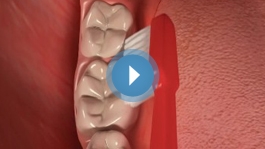Treatments
Preventative Dentistry » Dental Hygiene
As well as regular visits to the dentist, it’s important to keep up regular trips to the hygienist. Hygienists are key to preventing and treating gum disease, first by professionally cleaning your teeth with a scale and polish, and secondly by providing you with home cleaning advice and tips on diet.
Gum disease is the leading cause of tooth loss in adults in the UK. It is caused by the build-up of plaque on your teeth. If it is not removed by brushing properly, plaque will harden to form tartar, which you will need to visit the hygienist to remove.
There are two forms of gum disease; gingivitis, and the more serious form, periodontitis. Early signs of gingivitis are blood on your toothbrush or in your rinsing water when you brush your teeth. Your gums may also bleed when biting certain hard foods, such as apples. You may also notice soreness and swelling of your gums, as well as bad breath.
Left untreated, gingivitis can develop into periodontitis, which affects the tissues surrounding the teeth. The bone surrounding your teeth gradually deteriorates, causing teeth to become loose and eventually fall out. That’s why screening for gum disease is so important. Our hygienist can spot the early signs of gum disease and provide you with treatment and advice so it doesn’t develop into a more serious problem.
Our hygienist will also provide you with a bespoke home tooth cleaning plan, including advice on brushing, flossing and using interdental brushes to ensure your mouth is clean and healthy. She can also provide dietary advice and help with stopping habits such as smoking that are detrimental to your teeth.
You can also have a discussion concerning manual and electric toothbrushes, mouthwashes for gum disease as well as the choice that is best for you will be had. Waterflossers are also useful in providing optimum cleaning between teeth
For patients with a lot of decay, she can apply fluoride, and for children can also apply fissure sealant to the permanent back teeth soon after they come through, helping to prevent decay.





